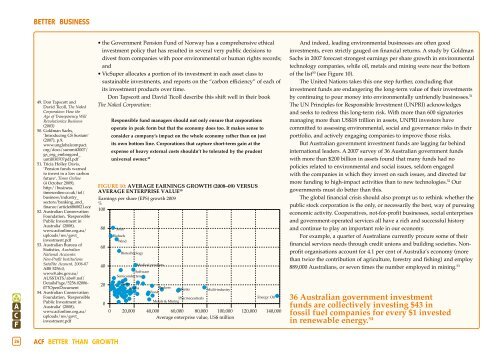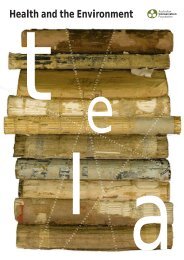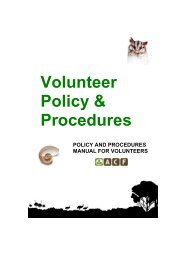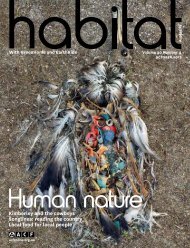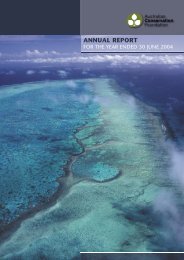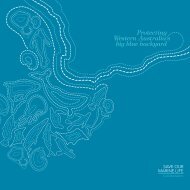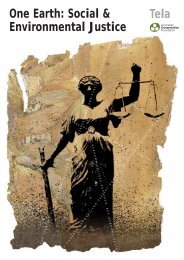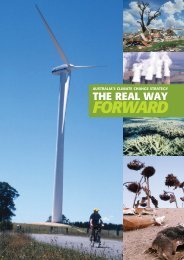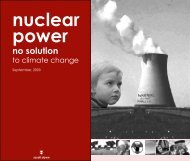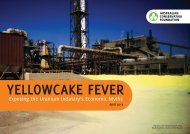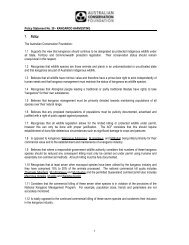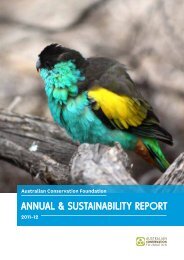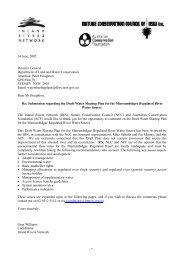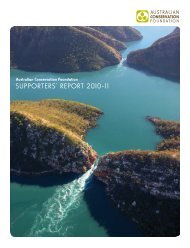Better than growth - Australian Conservation Foundation
Better than growth - Australian Conservation Foundation
Better than growth - Australian Conservation Foundation
Create successful ePaper yourself
Turn your PDF publications into a flip-book with our unique Google optimized e-Paper software.
etter business<br />
49. Don Tapscott and<br />
David Ticoll, The Naked<br />
Corporation: How the<br />
Age of Transparency Will<br />
Revolutionize Business<br />
(2003)<br />
50. Goldman Sachs,<br />
‘Introducing GS Sustain‘<br />
(2007), p.9,<br />
www.unglobalcompact.<br />
org/docs/summit2007/<br />
gs_esg_embargoed_<br />
until030707pdf.pdf<br />
51. Tricia Holley Davis,<br />
‘Pension funds warned<br />
to invest in a low carbon<br />
future‘, Times Online<br />
(4 October 2009),<br />
http://business.<br />
timesonline.co.uk/tol/<br />
business/industry_<br />
sectors/banking_and_<br />
finance/article6860021.ece<br />
52. <strong>Australian</strong> <strong>Conservation</strong><br />
<strong>Foundation</strong>, ‘Responsible<br />
Public Investment in<br />
Australia‘ (2008),<br />
www.acfonline.org.au/<br />
uploads/res/govt_<br />
investment.pdf<br />
53. <strong>Australian</strong> Bureau of<br />
Statistics, <strong>Australian</strong><br />
National Accounts:<br />
Non-Profit Institutions<br />
Satellite Account, 2006-07<br />
ABS 5256.0,<br />
www8.abs.gov.au/<br />
AUSSTATS/abs@.nsf/<br />
DetailsPage/5256.02006-<br />
07?OpenDocument<br />
54. <strong>Australian</strong> <strong>Conservation</strong><br />
<strong>Foundation</strong>, ‘Responsible<br />
Public Investment in<br />
Australia‘ (2008),<br />
www.acfonline.org.au/<br />
uploads/res/govt_<br />
investment.pdf<br />
• the Government Pension Fund of Norway has a comprehensive ethical<br />
investment policy that has resulted in several very public decisions to<br />
divest from companies with poor environmental or human rights records;<br />
and<br />
• VicSuper allocates a portion of its investment in each asset class to<br />
sustainable investments, and reports on the “carbon efficiency” of each of<br />
its investment products over time.<br />
Don Tapscott and David Ticoll describe this shift well in their book<br />
The Naked Corporation:<br />
Responsible fund managers should not only ensure that corporations<br />
operate in peak form but that the economy does too. It makes sense to<br />
consider a company’s impact on the whole economy rather <strong>than</strong> on just<br />
its own bottom line. Corporations that capture short-term gain at the<br />
expense of heavy external costs shouldn’t be tolerated by the prudent<br />
universal owner. 49<br />
FIGURE 10: AVERAGE EARNINGS GROWTH (2008–09) VERSUS<br />
AVERAGE ENTERPRISE VALUE 50<br />
Earnings per share (EPS) <strong>growth</strong> 2009<br />
%<br />
100<br />
80<br />
60<br />
40<br />
20<br />
0<br />
0<br />
Solar<br />
Biofuels<br />
Wind<br />
Biotechnology<br />
Medical products<br />
Software<br />
Semiconducters<br />
Water<br />
Media<br />
Brokers<br />
Food<br />
Banks<br />
Pharmaceuticals<br />
Metals & Mining<br />
Multi-industry<br />
Energy: Oil<br />
20,000 40,000 60,000 80,000 100,000 120,000 140,000<br />
Average enterprise value, US$ million<br />
And indeed, leading environmental businesses are often good<br />
investments, even strictly gauged on financial returns. A study by Goldman<br />
Sachs in 2007 forecast strongest earnings per share <strong>growth</strong> in environmental<br />
technology companies, while oil, metals and mining were near the bottom<br />
of the list 50 (see Figure 10).<br />
The United Nations takes this one step further, concluding that<br />
investment funds are endangering the long-term value of their investments<br />
by continuing to pour money into environmentally unfriendly businesses. 51<br />
The UN Principles for Responsible Investment (UNPRI) acknowledges<br />
and seeks to redress this long-term risk. With more <strong>than</strong> 600 signatories<br />
managing more <strong>than</strong> US$18 trillion in assets, UNPRI investors have<br />
committed to assessing environmental, social and governance risks in their<br />
portfolio, and actively engaging companies to improve those risks.<br />
But <strong>Australian</strong> government investment funds are lagging far behind<br />
international leaders. A 2007 survey of 36 <strong>Australian</strong> government funds<br />
with more <strong>than</strong> $200 billion in assets found that many funds had no<br />
policies related to environmental and social issues, seldom engaged<br />
with the companies in which they invest on such issues, and directed far<br />
more funding to high-impact activities <strong>than</strong> to new technologies. 52 Our<br />
governments must do better <strong>than</strong> this.<br />
The global financial crisis should also prompt us to rethink whether the<br />
public stock corporation is the only, or necessarily the best, way of pursuing<br />
economic activity. Cooperatives, not-for-profit businesses, social enterprises<br />
and government-operated services all have a rich and successful history<br />
and continue to play an important role in our economy.<br />
For example, a quarter of <strong>Australian</strong>s currently procure some of their<br />
financial services needs through credit unions and building societies. Nonprofit<br />
organisations account for 4.1 per cent of Australia’s economy (more<br />
<strong>than</strong> twice the contribution of agriculture, forestry and fishing) and employ<br />
889,000 <strong>Australian</strong>s, or seven times the number employed in mining. 53<br />
36 <strong>Australian</strong> government investment<br />
funds are collectively investing $43 in<br />
fossil fuel companies for every $1 invested<br />
in renewable energy. 54<br />
26<br />
ACF BETTER THAN GROWTH


